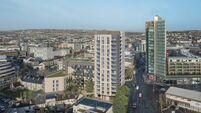Tents for refugees in sub-zero conditions 'do not meet Ireland's international obligations'

"There are 88 men staying in 11 tents — eight per tent — with just beds, no furniture, their belongings in bags beside their bed", Mr Quinn said.
A representative for the Jesuit Refugee Centre has told of the conditions being experienced by asylum seekers sleeping in tented accommodation in Co Clare.
Eugene Quinn visited the direct provision centre in Knockalisheen in Meelick where 88 asylum seekers are being accommodated in 11 tents.













